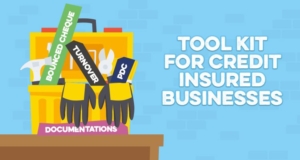
Tool kit for credit insured businesses
During these challenging times when overdues and claims are on the rise, it has never been more important for businesses that are using credit insurance to comply with the terms and conditions of their contract. Credit insurance is a technical bespoke product that requires a very good understanding of the general conditions. You should refer to your credit insurance policy or ask for advice from your broker to make sure that your business is aligned with your contract, but let’s try to summarize here the most important elements.
What are the common mismatches?
1. Not notifying an overdue on time
It is one of the basic principles of credit insurance: there is a timeline with a deadline to notify an overdue. The two main parameters that define this timeline are the maximum credit terms and the maximum extension period (MEP) also called “grace period”. It is mandatory to notify an overdue after the end of MEP and you should not raise any new invoice while the oldest unpaid invoice is not cleared. Depending on your contract, you have 30 days after the end of the MEP to inform your credit insurer. However, if you are aware of any adverse information about your buyer, you must inform your credit insurer immediately without waiting until the end of the MEP and the most common adverse information is a bounced cheque for insufficient funds.
2. Not reporting a bounced cheque
There is a common business practice among buyers in Dubai which consists in paying suppliers with postdated cheques (PDCs) to secure the payment. It offers a comfort to suppliers as they can deposit the cheque at the bank at the due date, but it is not a secure mode of payment as the cheque can bounce for insufficient funds The mistake would be not to inform your credit insurer even if the buyer proposed to redeposit the cheque in a couple of days. Most of the time, policyholders are reluctant to inform their credit insurers as they are worried about losing the credit limit, but it is irrelevant as the coverage is contractually already gone even if the credit limit still exists on the online portal. Indeed, at the time of notifying a claim the credit insurer will realize that the adverse information was not reported, and it will be considered as a breach of the contract.
3. Approving a repayment plan without prior approval of your credit insurer
If one of your customers is not able to clear his invoice before the end of the MEP and requests an extension of payment or proposes a repayment plan, it is mandatory to obtain the approval of your credit insurer before accepting it. Currently, most credit insurers offer an online option to request an extension of payment beyond the end of the MEP.
4. Not notifying your turnover properly
Not notifying your turnover is a major breach of your contract. Indeed, credit insurers charge a premium rate based on the amount of notified turnover, then if the turnover is not notified properly, it means that you are not paying the premium that you should pay. Furthermore, it is important to notify the real invoiced amount because at the time of a claim the credit insurer will check the declared amount and this could lead to a claim rejection if they notice discrepancies.
5. Rescheduling PDCs without prior approval of your credit insurer
As explained previously, buyers often offer PDCs to pay suppliers and it could happen that they request to hold the cheque beyond the deposit date to manage their cashflow. In such a scenario, you need to obtain the approval of your credit insurer before accepting it, as such a query is considered to be adverse information from a contractual point of view.
6. Not maintaining proper commercial documentation
At the time of a claim, you need to provide your commercial documentation, such as commercial invoices, purchase orders or sales contracts to get your claim indemnified. The main idea is to be able to prove two things – proof of sales and proof of delivery – in order to demonstrate that the sale currently happened. Indeed, credit insurers should have enough material elements to file for a legal case to pursue debtors.
The above points are some of the main parameters of your contract, but of course it may vary depending on how your broker has structured to a greater or lesser extent your contract.
To conclude, many businesses are starting to face delays in payment from buyers due to the Coronavirus impact on the economy and the level of bankruptcy globally will significantly increase in 2020. For the time being, credit insurers are reacting wisely by not removing boldly their coverage and most of them are currently extending the deadline to notify a claim which offers more flexibility to clients to handle this unprecedented situation.

